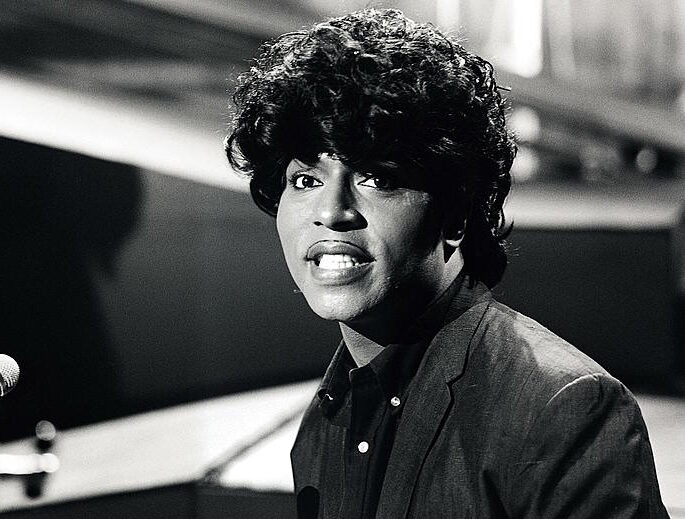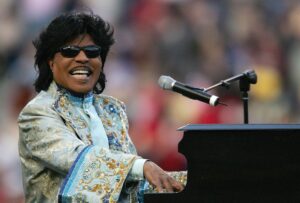Biography:
American singer Little Richard remained an influential figure in pop culture for 70 years. He has been called an innovator, creator and father of rock for his emotional vocalizations and rhythmic music, which played a key role in the formation of not only rock and roll, but also other genres, including soul and funk. He raised Paul McCartney and Elvis Presley and eradicated segregation from music. For such significant achievements, Little became one of the first singers to be immortalized in the Rock and Roll Hall of Fame.
Childhood and youth:
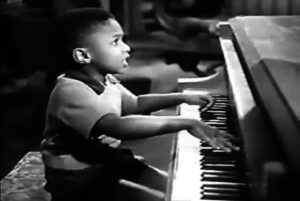
Richard Wayne Penniman was born in Macon, Georgia on December 5, 1932. He is the third of 12 children of Leva May (nee Stewart) and Charles Penniman. The nickname Little Richard, which later became a creative pseudonym, appeared in childhood due to his frail physique.
Little Richard’s parents were zealous Protestants. But at the same time, Charles Penniman, being a deacon, ran a nightclub and was involved in bootlegging during Prohibition. Little himself was interested in religion. He especially liked the charismatic Pentecostal movement for its love of music.
Gospel and spiritual singers were Little Richard’s first idols. As a child, Joe May, Rosetta Tharpe, Mahalia Jackson, and Marion Williams inspired him to master the alto saxophone and devote his life to preaching.
Much later, in 1970, the celebrity was ordained a priest. He fulfilled his entrusted duties until his death: he conducted wedding ceremonies, personally buried his friends and colleagues in the profession, and read sermons. Sometimes more than 20 thousand parishioners gathered to listen to the father of rock. The main theme of his sermons was the unification of the races.
Personal life:

In his youth, Little Richard tried on women’s clothes and wore bright makeup, and was friends with girls. This behavior caused aggression not only among peers, but also among Charles Penniman. At the age of 15, he kicked his son out of the house, not accepting his femininity.
At the age of 20, the young man realized that he liked to watch other people commit adultery. Because of his fetish, the singer was repeatedly imprisoned. One of the victims of his voyeurism was Audrey Robinson, with whom Little Richard had an affair in 1956. In his biography, the musician wrote that he often “offered” it to his friends and enjoyed the spectacle. Audrey herself denied these statements.
In October 1957, Little Richard met his future wife, Ernestine Harvin. The wedding took place on July 12, 1959. Later in the interview, the woman described their personal life as happy, “with normal sexual relationships.” The couple even adopted a boy, Danny Jones.
In 1964, Ernestine filed for divorce. She explained the decision because Little Richard was busy, and the singer saw the reason in his sexuality. Audrey Robinson and Ernestine Campbell, named after her new husband, called the words of the ex-chosen one “self-defamation.”
The man regularly changed his mind about his sexuality. In a 1995 interview with Penthouse, he said: “I’ve been gay all my life.” And in 2007, in a Mojo article, he classified himself as bisexual. In October 2017, on the Three Angels Broadcasting Network, the singer called all non-heterosexual manifestations a “disease.”
Little Richard lived up to his nickname. His height is 178 cm. But the singer himself joked in the 1970s that it would be more reasonable to call him Lil Cocaine due to his strong drug addiction.
In the 1950s, the artist did not smoke or take alcohol or drugs, but by the mid-1960s he became addicted to “weed” and began to drink a lot. By 1972, he was seriously addicted to cocaine, and by 1975, to heroin and angel dust. Only a series of losses – the death of his brother from a heart attack, the murder of his nephew, whom the musician loved as his own son, and two close friends – forced Little to give up any addiction.
Music:
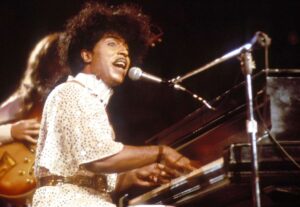
Billy Wright set Richard on the path of rhythm and blues. Oddly enough, the prince of the dish, as he was called in the pop scene, created the style for the father of rock. Pompadour hairstyle, narrow, pencil-drawn mustache and, of course, makeup – the photographs capture that legendary image.
Tutti Frutti is a 1955 single that brought fame to Little Richard (as well as Elvis Presley and The Beatles). He demonstrated the singer’s character – restless, energetic, playful. This frivolity captivated listeners and critics, and the song became a hit. Like the subsequent Long Tall Sally, Tutti Frutti sold 1 million copies in a matter of months.
Before Little Richard appeared in the United States, there were concerts for “whites” and concerts for “blacks.” The singer allowed himself to be listened to by both. The crowd, however, was divided, for example, by “blacks” on the balcony and “whites” on the dance floor. Richard also proved that black musicians could perform in white states. True, with restrictions.
The film Green Book (2018) plays on this fact. Don Shirley, the main character, is also black. Residents all over America like his catchy jazz; he is invited to give concerts, but is not seated, for example, at a table with “whites.” Little Richard faced the same problems. By the way, his song Lucille (1957) is heard in this film.
Little Richard’s albums, despite their popularity, did not hit the charts and, accordingly, did not bring money to the singer. Then he abandoned music in favor of religion. And radio stations continued to play Tutti Frutti and, for example, Good Golly, Miss Molly (1956). The man refused any fees for this, considering rock and roll “demonic.” In the 1960s, he turned to gospel music.
Little Richard was pushed to return to his “native” genre by The Beatles and The Rolling Stones , with whom he performed in 1962 and 1963. Mig Jagger later said:
“I heard that the crowd was going wild to Little Richard, but I thought it was an exaggeration. And when I saw it with my own eyes, I realized that everything was true. Little Richard is a rabid beast on stage.”
Since then, the artist has not betrayed rock and roll. He said that music is a blessing that is sometimes used for evil. This was until 1979, when the singer destroyed himself with drugs.
Little Richard’s discography includes 19 studio albums and dozens of videos (mostly live recordings), and his filmography includes 30 projects. These include biopics, such as Jimi Hendrix (1973), and musical comedies, such as King Ralph (1991), in which a celebrity sings with actor John Goodman .
Little Richard’s influence on other musicians is much more significant. His talent was inspired by Michael Jackson and Freddie Mercury , Paul McCartney with George Harrison from The Beatles and Mick Jagger with Keith Richards from The Rolling Stones, Elton John , Lou Reed , Tina Turner , Patti Smith , Tom Jones , Malcolm Young , Tanya Tucker and even contemporary artists Bruno Mars and Mystikal. The list is endlessly long. Each of them took something different from Richard. Through his example, each of these performers became a legend.
Last years:
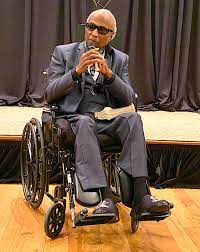
In 1986, in the wake of the success of the book about the life of Little Richard, his new album “Lifetime Friend” was released, combining gospel and rock. That same year, the singer was one of the first to be inducted into the Rock and Roll Hall of Fame . Since then, the musician began to often appear in cameo roles in films, at group concerts, and record duets with many performers ( Elton John , Jon Bon Jovi , Jerry Lee Lewis , Solomon Burke , etc.), he stopped recording new material, although he occasionally gave concerts. At the same time, Little Richard continued to preach and act as a priest, often marrying celebrities (the weddings of Bruce Willis , Bruce Springsteen , etc.). In 1993, the musician won a Grammy Award for lifetime achievement .
In 2000, a feature film was released about the life of Little Richard.
Death:
Despite his turbulent youth, Little Richard lived to be 87 years old. He died on May 9, 2020, the cause of death was a complication of bone cancer. The funeral took place despite restrictive measures due to the coronavirus pandemic. True, the closest ones gathered – the singer’s brother and sister, his son and nephews. He is buried in Chatsworth Cemetery, near Los Angeles, California.
Awards and honorary titles:
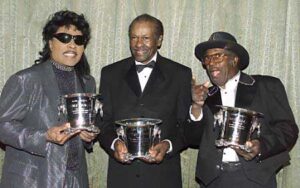
In 1986, Little Richard was one of the first 10 inductees into the Rock and Roll Hall of Fame. In 1993, he was awarded a lifetime achievement award from the National Academy of Recording Arts and Sciences, and a year later, the Rhythm and Blues Foundation awarded him its prestigious Pioneer Award.
In subsequent years, the once dynamic performer retired from the concert stage. He became ill while performing in Washington, D.C. in the summer of 2012. The following September, Little Richard suffered a heart attack. He described the incident to Cee Lo Green during an interview in Atlanta: “Last night I didn’t know I was having a heart attack. I was coughing and my right arm hurt.”
The singer took baby aspirin, which, according to his doctor, saved his life. The deeply religious music icon attributed his survival to a higher power:
ALBUMS:
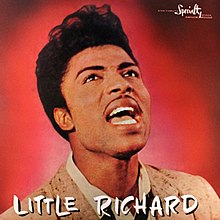
This discography contains original American studio albums with new recordings (it is worth noting that many albums are just re-recordings of old songs for different labels). Little Richard has published and continues to publish an enormous number of collections, official, semi-official and bootlegs, so the discography shows only the most significant official collections in the musician’s work. Year Title Notes
- 1957 Here’s Little Richard Studio album
- 1958 Little Richard Studio Album
- 1959 The Fabulous Little Richard Studio album (mostly 1955 recordings)
- 1960 Clap Your Hands Studio album (church hymns)
- 1960 Pray Along with Little Richard, Volume 1: A Closer Walk With Thee Studio album (church hymns)
- 1960 Pray Along with Little Richard, Volume 2: I’m Quitting Show Business Studio album (church hymns)
- 1962 King of the Gospel Singers Studio album (gospel)
- 1963 Little Richard Sings Spirituals Studio album (spirituals)
- 1963 Little Richard Collection of recordings made in 1952 for RCA Records
- 1964 Little Richard Sings the Gospel Studio album (gospel)
- 1964 Little Richard Is Back And There’s A Whole Lotta Shakin’ Goin’ On! Studio album
- 1964 Greatest Hits Studio Album (Vee-Jay)
- 1965 The Wild and Frantic Little Richard Studio album
- 1965 The Incredible Little Richard Sings His Greatest Hits Live! Concert recording
- 1967 The Explosive Little Richard Studio album
- 1967 Greatest Hits: Recorded Live! Concert recording (Okeh)
- 1967 Rock’n’Roll Forever Studio album
- 1969 Good Golly Miss Molly Studio Album
- 1969 Little Richard Studio album
- 1969 Right Now Studio album
- 1970 Rock Hard Rock Heavy Studio album
- 1970 Little Richard Studio album
- 1971 Well Alright! Collection of recordings from 1964 and 1957. for Specialty (planned for release in 1964)
- 1970 The Rill Thing Studio album
- 1971 Mr. Big Studio album
- 1971 King Of Rock And Roll Studio Album (Reprise)
- 1972 Southern Child Unreleased album
- 1972 The Second Coming Studio album
- 1972 The Original Studio album
- 1972 You Can’t Keep a Good Man Down Studio album
- 1973 Rip It Up Studio album
- 1974 Talkin’ ‘Bout Soul Studio Album
- 1974 Little Richard Recorded Live Concert Recording
- 1975 Keep a Knockin’ Studio Album
- 1976 Little Richard Sings Studio album
- 1976 Little Richard Live Concert Recording
- 1977 Little Richard Now Studio album
- 1985 The Essential A collection of hits recorded on Specialty Records in 1955-57.
- 1986 Lifetime Friend Studio album
- 1988 Lucille Studio album
- 1989 The Specialty Sessions A collection of all Specialty Records recordings from 1955-57 and 1964, including previously unreleased studio outtakes (3 discs)
- 1989 The Formative Years: 1951-53 A collection of the earliest recordings from 1951-53.
- 1991 The Georgia Peach A collection of hits recorded on Specialty Records in 1955-57.
- 1992 Shake It All About Studio album (music for children)
- 1991 Shag On Down By The Union Hall A collection of songs recorded on Specialty Records
- 1955-57 and 1964, including rare studio outtakes (addition to The Georgia Peach compilation)
- 2004 Get Down With It: The Okeh Sessions A collection of songs recorded on Okeh Records from 1967-69.
- 2005 King Of Rock’n’Roll: The Complete Reprise Recordings A collection of songs recorded on Reprise Records in 1970-72, including previously unreleased songs (3 discs)
- 2006 The Best of Little Richard: The Vee Jay Years A collection of songs recorded on Vee Jay Records in 1964-65.
Interesting Facts:
- Little Richard performed at Bill Clinton’s inauguration in January 1993. The musician attended such a significant event at his personal invitation – he adored the work of the father of rock. The singer was not satisfied with the role of a guest, so after the official part, together with Chuck Berry, he performed a song written specifically for Bill Clinton.
- The performer did not attend the induction ceremony of his name into the Rock and Roll Hall of Fame because he was recovering from an accident that occurred in October 1985. But he recorded a video message, which was greeted with applause. By the way, Little Richard entered the Rock and Roll Hall of Fame in 1986 as one of 10 artists. Among them were also Elvis Presley, Buddy Holly, Fats Domino.
- The parents planned to name the singer Ricardo. The name Richard was entered on the birth certificate due to inadvertence.
- Little Richard has one leg shorter than the other, so he always walked in a crouch.
